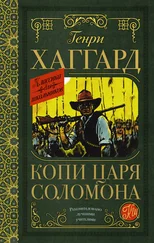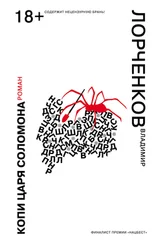army ['Q:mI], column ['kOlqm], aught [O:t]
If a white man comes to my gates I will send him back; if a hundred come, I will push them back; if an army comes, I will make war on them with all my strength, and they shall not prevail against me. None shall ever come for the shining stones; no, not an army, for if they come I will send a regiment and fill up the pit, and break down the white columns in the caves and fill them with rocks, so that none can come even to that door of which ye speak, and whereof the way to move it is lost. But for ye three, Incubu, Macumazahn, and Bougwan, the path is always open; for behold, ye are dearer to me than aught that breathes.
"And ye would go (и вы сможете уйти). Infadoos, my uncle, and my Induna, shall take thee by the hand and guide thee, with a regiment (Инфадус, мой дядя и мой индуна /советник/, возьмет вас за руку и отведет вас, в сопровождении своего полка). There is, as I have learned, another way across the mountains (есть, как я выяснил, другой путь через горы) that he shall show ye (который он покажет вам). Farewell, my brothers, brave white men (прощайте, братья мои, храбрые белые люди). See me no more, for I have no heart to bear it (мы больше с вами не увидимся: «больше не ищите встречи со мной», потому что сердце мое этого не выдержит; to see — видеть; видеться, встречаться ). Behold, I make a decree, and it shall be published from the mountains to the mountains (слушайте, я издам указ, который огласят, /передавая его/ с горы на гору; to publish — публиковать, оглашать, обнародовать ), your names, Incubu, Macumazahn, and Bougwan, shall be as the names of dead kings (и ваши имена, Инкубу, Макумазан и Бугван, будут подобны именам умерших королей), and he who speaks them shall die (и тот, кто произнесет их, умрет). So shall your memory be preserved in the land forever (и так память о вас сохранится в нашей стране навсегда).
uncle [ANkl], guide [gaId], decree [dI'kri:], publish ['pAblIS], memory ['memqrI], preserved [prI'zq:vd]
"And ye would go. Infadoos, my uncle, and my Induna, shall take thee by the hand and guide thee, with a regiment. There is, as I have learned, another way across the mountains that he shall show ye. Farewell, my brothers, brave white men. See me no more, for I have no heart to bear it. Behold, I make a decree, and it shall be published from the mountains to the mountains, your names, Incubu, Macumazahn, and Bougwan, shall be as the names of dead kings, and he who speaks them shall die. So shall your memory be preserved in the land forever.
"Go, now, ere my eyes rain tears like a woman's (ступайте же, теперь, а то мои глаза зальются слезами, подобно глазам женщины; rain— дождь; потоки; ручьи /слез/; to rain— идти, литься /о дожде/; литься; обрушиваться градом /в большом количестве/ ). At times when ye look back down the path of life (временами, когда вы будете вспоминать свой жизненный путь; to look back— оглядываться; вспоминать, оглядываться на прошлое ), or when ye are old and gather yourselves together to crouch before the fire (или, когда вы состаритесь и соберетесь вместе, чтобы присесть /и погреться/ у огня; to crouch— присесть, прижаться к земле /чаще о животном/; преклонить /колени, голову/ ), because the sun has no more heat (потому что солнце уже не будет согревать /вас/: «у солнца больше нет тепла»; heat— жара, жар, тепло, теплота ), ye will think of how we stood shoulder to shoulder in that great battle (вы будете думать о том, как мы стояли плечом к плечу в той великой битве) that thy wise words planned, Macumazahn (которую наметили/рассчитали твои мудрые слова, Макумазан); of how thou wast the point of that horn that galled Twala's flank, Bougwan (или как ты, Бугван, был острием того рога, который ударил по флангу Твалы; gall— ссадина, натертое место; больное место; to gall— стирать, натирать; раздражать, беспокоить; gall — желчь ); whilst thou stoodst in the ring of the Grays, Incubu (в то время как ты, Инкубу, стоял в окружении/кольце вместе с "Серыми"), and men went down before thine axe like corn before a sickle (и /о том/, как воины падали перед = под твоим боевым топором, словно колосья пред серпом); ay, and of how thou didst break the wild bull's (Twala's) strength, and bring his pride to dust (и о том, как ты сломил силу дикого быка (Твалы) и поверг его гордыню в прах). Fare ye well forever, Incubu, Macumazahn, and Bougwan, my lords and my friends (прощайте навсегда, Инкубу, Макумазан и Бугван, мои повелители и мои друзья)."
crouch [krauC], shoulder ['Squldq], gall [gO:l], sickle [sIkl], pride [praId]
"Go, now, ere my eyes rain tears like a woman's. At times when ye look back down the path of life, or when ye are old and gather yourselves together to crouch before the fire, because the sun has no more heat, ye will think of how we stood shoulder to shoulder in that great battle that thy wise words planned, Macumazahn; of how thou wast the point of that horn that galled Twala's flank, Bougwan; whilst thou stoodst in the ring of the Grays, Incubu, and men went down before thine axe like corn before a sickle; ay, and of how thou didst break the wild bull's (Twala's) strength, and bring his pride to dust. Fare ye well forever, Incubu, Macumazahn, and Bougwan, my lords and my friends."
He rose, looked earnestly at us for a few seconds (он поднялся, серьезно посмотрел на нас в течение нескольких секунд), and then threw the corner of his kaross over his head, so as to cover his face from us (и затем набросил полу: «угол» своего каросса себе на голову, чтобы скрыть от нас свое лицо; so as to — с тем чтобы, для того что бы, так что ). We went in silence (мы молча ушли: «ушли в молчании»).
Next day at dawn we left Loo (на следующий день, на рассвете, мы покинули Лу), escorted by our old friend Infadoos who was heart-broken at our departure, and the regiment of Buffaloes (в сопровождении нашего старого друга Инфадуса, который был очень расстроен нашим уходом, и полка "Буйволов"; to break — ломать; to break smb.’s heart — разбить чье-либо сердце; heart-broken — убитый горем, с разбитым сердцем ). Early as the hour was, all the main street of the town was lined with multitudes of people (хотя это и был ранний час, множество людей стояли вдоль главной улицы города; to line — проводить линии, линовать; стоять, тянуться вдоль/чего-либо/ ), who gave us the royal salute as we passed at the head of the regiment (они приветствовали нас королевским приветствием = как королей, когда мы проходили во главе полка), while the women blessed us as having rid the land of Twala (в то время как женщины благословляли нас за то, что мы избавили землю от Твалы; to rid — освобождать, избавлять/of — отчего-либо, кого-либо/ ), throwing flowers before us as we went (и бросали цветы нам под ноги: «пред нами», пока мы шли). It really was very affecting (действительно, все это было очень трогательно; to affect — воздействовать/на что-либо/, влиять; волновать, трогать ), and not the sort of thing one is accustomed to meet with from natives (и совсем не было похоже на то, к чему обычно привыкаешь /и что обычно испытываешь, живя/ с туземцами; to accustom — приучать, делать знакомым, привычным; accustomed — привыкший, приученный; custom — обычай; to meet with — испытать, подвергнуться ).
Читать дальше
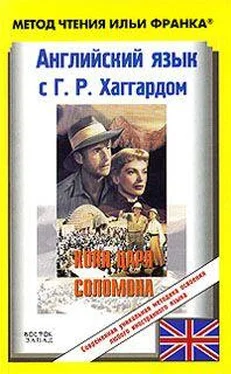
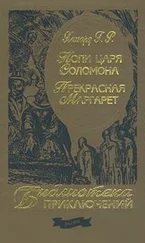
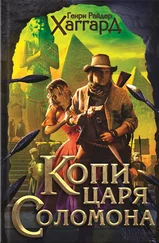

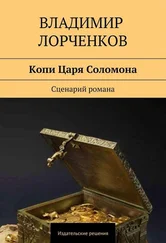
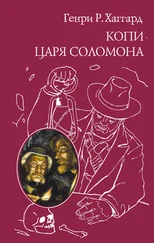

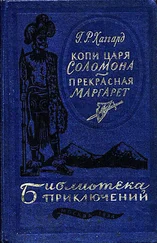
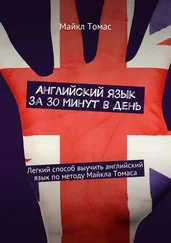

![Генри Хаггард - Копи царя Соломона. Священный цветок [сборник]](/books/429144/genri-haggard-kopi-carya-solomona-svyachennyj-cvetok-thumb.webp)
